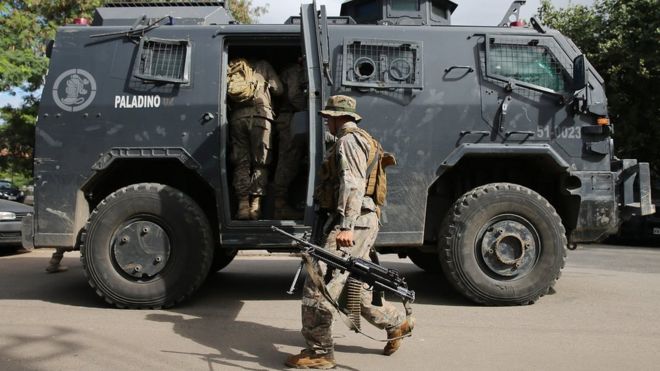By: Max Cohen
Impunity Watch Reporter, South America
RIO DE JANEIRO, Brazil – After a police officer was killed in the Vidigal favela, police officers and their families began protesting the rising levels of violence. So far, approximately ninety-one police officers have been killed in the Rio state. Brazil’s government has deployed as many as 8,500 soldiers to the city, and is set to deploy up to 10,000, to help abate its crime problem.

Violence has been rising in the area since the end of the Olympics, and Brazil is currently experiencing the worst recession in its history. Corruption also rages rampant among government officers. An average of three people per day have been killed by stray bullets in the first six months of this year alone. This is in addition to alleged human rights abuses by the police, who caused the deaths of more than 800 people last year. In the first two months of this year alone the number of killings by Rio police were at 182, 78 percent more than at the same point last year.
The protestors, who gathered at the seafront in Copacabana complained about their loved ones trying to stem the tide of violence with few resources. They also deride the fact that the hard work of honest policemen isn’t given as much attention as alleged human rights abuses, and the officers themselves have been fighting to change the penal code to punish the killings of police officers more harshly.
A few weeks prior however, residents of Rio’s favelas packed the same area, pleading for an end to the lethal shootouts between drug traffickers and police. That protest came after a pregnant mother and her child were both seriously injured in a crossfire that took place in one of these shantytowns on the outskirts of Rio.
Brazilian Defense Minister Raul Jungmann has said that the soldiers would soon begin participating in operations against drug traffickers, a departure from their previously limited role in patrolling, manning checkpoints, and recovering weapons seized during raids. Due to President Michel Temer’s decree, the troops can remain in the city up until the end of 2018. While their efforts are focused on the city’s north side, where the violence has been more pervasive, armored vehicles also patrolled other, quieter areas in the city.
For more information, please see:
Deutsche Welle – Brazil sends troops to Rio de Janeiro to fight organized crime – 29 July, 2017
ABC News – Troops deploy in Rio de Janeiro amid increasing violence – 28 July, 2017
BBC – Rio de Janeiro begins deploying 10,000 troops to fight crime surge – 28 July, 2017
BBC – Rio de Janeiro: Police protest over rising Brazil violence – 23 July, 2017
Al Jazeera – Rio’s favela residents protest against killings – 2 July, 2017